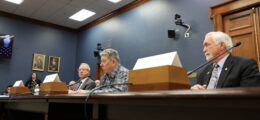June 4, 2024 Last Edit: July 29, 2024
Mega Omnibus and Other Bills Bring New Rules and Regulations for Minnesota Small Businesses
The 2024 Minnesota Legislative Session came to a chaotic conclusion for the year at midnight on Sunday, May 19.
In the first recap, we looked at how this year’s session ended and some of the victories for small business owners. You can read it here: Minnesota 2024 Legislative Session Recap, Vol. 1 – NFIB.
In this edition, we’ll look at some of the new mandates and regulations that impact small businesses in Minnesota.
Small Business CHALLENGES
NFIB Minnesota supported legislation to give small business owners a break on taxes and mandates, and we successfully pushed back on a wide range of harmful proposals this year.
With the power of your voice, we were able to make a difference at the Minnesota Legislature.
Unfortunately, some concerning proposals did make it into law.
Inclusive Pricing Mandate: Lawmakers imposed new regulations on the use of fees to recoup business costs on top of the base price of a good or service (see HF 3438). In general, the new law requires the advertisement of a price to be inclusive of all mandatory fees or surcharges.
However, there are many important exceptions and caveats for small business to understand in this law:
– Applies to mandatory fees that: (1) must be paid to purchase a good or service, (2) are not reasonably avoidable, and (3) a reasonable person would expect to be included in the final price.
– Does not apply to government-imposed taxes and fees (but does apply to employer-imposed fees that are intended to cover the cost of government mandates)
– Does not apply to a reasonable postage or shipping fee actually incurred by the consumer.
– Does not apply in auctions for goods or services where the total cost is indeterminable if any mandatory fees associated with the transaction are clearly and conspicuously disclosed and a notice is provided that the total cost may vary.
– Does not apply to services where the total cost of a service (1) is determined by consumer selections and preferences or (2) relates to distance or time, so long as the business clearly and conspicuously discloses the factors that determine the final price, any mandatory fees associated with the transaction, and that the final price may vary.
– Does not apply to a food or beverage service establishment, including a hotel, that charges an automatic and mandatory gratuity if a clear and conspicuous notice of the fee is included in the advertisement. (Note: there is confusion about whether this exclusion applies to a health and wellness charge to cover employee healthcare or other benefits. We are awaiting clarification from the state prior to the bill taking effect.)
– Does not apply to fees related to the purchase or lease of a motor vehicle charged by a motor vehicle dealer, or fees, surcharges or other costs associated with real estate settlement services (real estate broker commissions and fees are covered, subject to the other limitations).
The inclusive pricing law takes effect January 1, 2025.
Independent Contractor Regulations and Penalties: Among the most troubling pieces of legislation to become law this year were harsh new penalties and regulations on the classification of workers as independent contractors (see HF 5247, Article 10).
For all businesses, the bill opens the door to civil lawsuits by workers against businesses for alleged worker misclassification violations. In addition to actual damages in the form of lost wages, businesses are subject to potential penalties of up to $10,000 per violation.
Moreover, any business owner that “knowingly or repeatedly” misclassifies workers as independent contractors is subject to personal liability (meaning liability does not stop with the business).
For construction contractors, the bill expands the worker classification test from nine factors to fourteen factors (some of which have multiple components).
Notably, a business or individual will have to prove they “have received and retained 1099 forms for income for building construction or improvement services” and “completed a provided a W-9 federal income tax form to the person for whom the services were provided if required by federal law.”
In addition, an agreement between a business and an independent contractor must be made in a written contract for specific services. Unlike earlier versions of this bill, the written contract requirement does not apply to change orders.
The bill’s increased penalties take effect on July 1, 2024. The revisions to the construction independent contractor classification test apply to work performed on or after March 1, 2025.
Lastly, the bill establishes an interagency partnership between the Minnesota Attorney General, Department of Revenue, Department of Labor, Department of Commerce, and Department of Employment and Economic Development. This partnership is intended to facilitate more consistent enforcement of worker classification laws.
NFIB will be watching this group closely to ensure it does not abuse its power in an effort to intimidate innocent small business owners.
Workplace Drug Testing Changes. DFLers made additional changes to the workplace drug testing restrictions passed in last year’s recreational marijuana legalization bill.
Among other changes, employers are given an oral fluid test option to test employees and job applicants for drug and alcohol or cannabis in lieu of laboratory testing.
If an employer opts for an oral fluid test, the employee must be notified of the result at the time of the test. When an oral fluid test is positive, inconclusive, or invalid, a job applicant or employee may request – at the employer’s cost – laboratory testing.
Laboratory testing requirements are laid out in Sec. 181.953.
In general, testing employees and applicants remains highly regulated (see, e.g., cannabis testing limits in Sec. 181.952, Subds. 8-9). This includes being limited to where required in state and federal law and employers needing a written testing policy for employers and applicants.
Read more about last year’s changes here: Minnesota Legislature Session Recap Part IV: Marijuana Legalization – NFIB.
Watch NFIB Minnesota’s Drug Testing Webinar here: Minnesota Members: Marijuana Legalization and Your Small Business – NFIB.
Salary Ranges in Job Postings: Beginning January 1, 2025, businesses with 30 or more employees are required to include a good faith salary range in each job posting (see HF 3852, Art. 7, Sec. 2).
Prohibition on Deducting Credit Card Processing Fee from Employee Gratuities: Beginning on August 1, employers are no longer permitted to deduct a share of the credit card processing fee from an employee’s gratuity (see HF 3852, Art. 7, Sec. 1). Under the old law, employers could deduct a portion of the credit card processing fee from the gratuity that is proportional to the share of the total payment that is attributable to the gratuity.
Elimination of Subminimum Wages: Most employers in Minnesota are subject to the statewide “large employer” minimum wage, which is currently $10.85 per hour. Large employer means any business with more than $500,000 in annual gross revenue.
At the behest of unions and other activists, the Minnesota Legislature eliminated several “subminimum wages” this year (see HF 3852, Art. 7, Sec. 6). These wage rates applied to: (i) businesses with less than $500,000 in annual gross revenue, resort and lodging workers working under a J Visa, and youth workers under the age of 18.
Beginning on January 1, 2025, hourly minimum wage rates for those groups will go from $8.85 per hour to the statewide minimum wage.
Lawmakers kept the “training wage” for employers under the age of 20, who can be paid a minimum hourly rate of $8.85 for the first 90 days of employment. That rate will be adjusted for inflation on January 1, 2025 under existing law.
Lastly, the annual minimum wage inflationary adjustment cap is increased from 2.5% to 5% per year.
Ban on Customer No-Poach Clauses: Businesses are prohibited from including no-poach clauses in customer agreements (see HF 3852, Art. 2, Sec. 53). These types of agreements prohibit a customer from hiring an employee from a business where the customer purchases services. It comes on the heels of last year’s statewide ban on employee noncompete agreements.
No-poach agreements are common in parental agreements with child care providers, but no exceptions were included in the final version.
The prohibition applies to customer agreements entered into on or after July 1, 2024.
—–
This is the second in a series of recaps on the 2024 Minnesota Legislative Session. In future editions, we’ll focus on additional mandates and regulations passed this year.
NFIB is a member-driven organization advocating on behalf of small and independent businesses nationwide.
Related Articles














